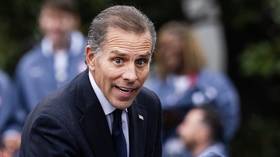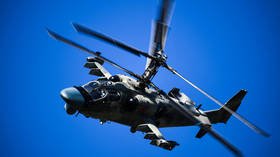STRATCOM chief claims nuclear war with Russia or China a ‘REAL POSSIBILITY,’ says US can’t assume ‘strategic deterrence will hold’
The head of US Strategic Command is warning that nuclear war with Russia or China is “a real possibility,” pointing to “destabilizing” behaviors of America’s rivals. He also claims the Pentagon is not “stuck in the Cold War.”
“There is a real possibility that a regional crisis with Russia or China could escalate quickly to a conflict involving nuclear weapons, if they perceived a conventional loss would threaten the regime or state,” STRATCOM chief and Vice Admiral Charles Richard wrote in the February issue of the US Naval Institute's monthly magazine.
STRATCOM, which oversees the US nuclear arsenal, views the probability of nuclear war as low. But with Russia and China advancing their capabilities and continuing to “exert themselves globally,” Richard said STRATCOM must understand what it's facing.
In the absence of change, we are on the path, once again, to prepare for the conflict we prefer instead of one we are likely to face.
If that sort of talk seems reminiscent of the Cold War, that's because it probably is. But Richard claims the US military has focused on counter-terrorism for two decades while ignoring “the nuclear dimension.”“I bristle when I hear the Department of Defense accused of being stuck in the Cold War,” he said. “The department is well past the Cold War.”
So what has the Pentagon been up to? According to Richard, US forces have been completely immersed in fighting terrorism, to the extent that Russia and China have used that to “aggressively” challenge “international norms and global peace using instruments of power and threats of force in ways not seen since the height of the Cold War.” He cited alleged instances of “cyberattacks and threats in space” in particular.
Cold War 2.0?https://t.co/Vma6IHCfQv
— RT (@RT_com) December 20, 2020
Richard even claimed that the rival powers are taking advantage of the Covid-19 pandemic to advance their agendas. “We must actively compete to hold their aggression in check,” he said, adding that failing to do so will further embolden Russia and China and lead allies to think the US is unable or unwilling to “lead.”
Such saber-rattling has escalated in recent years, especially between Washington and Moscow. Russia tweaked its nuclear doctrine in 2018 to allow for use of such weapons in response to a nuclear attack or to a conventional attack that threatens the nation's existence. A Pentagon official said in 2019 that the US would retain its right to carry out a nuclear first strike in response to a conventional attack, noting that allies wouldn't otherwise believe they are protected.
Also on rt.com US says it won't rule out nuclear first strike, because allies wouldn't trust it otherwiseSuch statements and, more importantly, US weapons developments, have raised eyebrows in Moscow. US leadership “has made a decision to consider a nuclear conflict as a viable political option and are creating the potential necessary for it,” Russia's Foreign Ministry spokeswoman Maria Zakharova said last March.
Likewise, the STRATCOM chief cited Russia's modernization of its nuclear forces, which he estimated to be about 70 percent complete, as a concern. Noting that Moscow has built “new and novel” systems, such as hypersonic glide missiles, he claimed that it has ignored “international norms” through such actions as an anti-satellite test last year.
The US Navy's latest war of words with Russiahttps://t.co/ZoKck4O8Re
— RT (@RT_com) December 18, 2020
Richard added that China also is making “technological leaps” and, like Russia, has harassed US and allied aircraft and forces operating in international airspace and waters. Saying the Chinese nuclear arsenal could double, triple or quadruple in the next decade, he suggested “the US must take action today to position itself for the future.”
We must start by acknowledging that our most fundamental assumption – that strategic deterrence will hold, even though crisis and conflict – is going to be tested in ways not seen before.
In conclusion, Richard says the US military must shift its stance from assuming that nuclear war won't happen to working to meet and deter the real possibility of such a conflict – or else “risk suffering embarrassment – or perhaps worse – at the hands of our adversaries.”
The renewed talk of a possible nuclear war comes days after Moscow and Washington agreed to prolong the New START nuclear arms reduction treaty, thought to have been doomed to expire by the Donald Trump administration. But after four years of US-Russia relations being hamstrung by the Russiagate conspiracy against Trump, there appears to be little likelihood of more peaceful ties under President Joe Biden. Two weeks after being inaugurated, Biden said on Thursday that the days of the US “rolling over” to Russian President Vladimir Putin have ended.
Also on rt.com In confronting Russian ‘aggression’, Biden forgets he is the problem, not the solutionBiden, who plans to cancel Trump's order to withdraw 9,500 US troops from Germany, demanded that Russia immediately release opposition politician Alexey Navalny, who was jailed for violating his probation from a money-laundering conviction. “We will not hesitate to raise the cost on Russia and defend our vital interests and our people,” Biden said.
The bellicose statements on nuclear war are more dangerous than they might seem, former UN weapons inspector Scott Ritter told RT. The US hasn't built up its conventional military forces to the extent it could be guaranteed victory over Russia or China, so Washington would likely deploy nuclear weapons in a war with either of those countries, Ritter argued. Russia would have no choice but to respond to such an attack in kind, he said.
“This is what makes the admiral's statements about preparing for nuclear war so dangerous because there is no way of containing it,” Ritter said.
If there is a nuclear war between the US and Russia, it will be a general nuclear war, which means not only will both nations be annihilated, but the world will also be destroyed as we currently know it.
Admiral Charles Richard issued a warning that that US forces must shift their principal assumption from ‘nuclear employment is not possible’ to ‘nuclear employment is a very real possibility.’ Military expert Scott Ritter tells RT that the warning itself poses a danger. pic.twitter.com/hG6zS7f2LB
— RT (@RT_com) February 5, 2021
Think your friends would be interested? Share this story!














